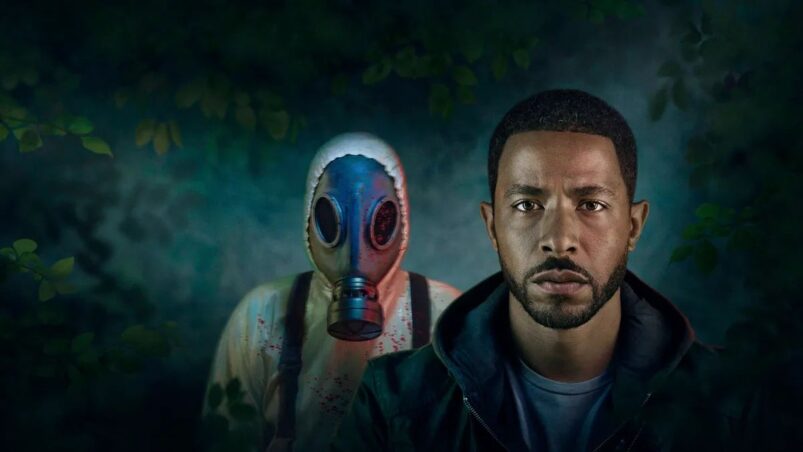More than a mystery, more than a thriller, Wolf could be best described as a twisty, turny thing. The twists are the big beats it’s building to. The issue is that it gins up the most tension and energy during these buildups, rather than the climactic moments of the twists. It still has the tension, don’t get me wrong, and this makes it very watchable – just inherently flawed.
Wolf does a manful job at layering at least three largely disparate plotlines together. Five years ago, two teens were murdered – a posh family’s been taken hostage in their own home – the man who ends up investigating this mess is still troubled by how his brother was abducted by a paedophile. Admittedly he’s the lynchpin in connecting it all, but for all that he manages to make it seem surprisingly seamless.
So much of Wolf is done as a straight drama. The scenes with the policeman are suitably investigatory, the kidnapped family’s bits are appropriately harrowing. And the villains of the piece seem like genuinely nasty pieces of work, except when they’re alone together. Then they end up squabbling like toddlers, like an evil Rik Mayall and Ade Edmondson.
Initially, this threatens to undercut the whole production near-fatally. But then it just becomes funny, and couldn’t help but make me think that there’s a certain layer of parody to the rest of the show. In particular, the one female detective present came off as so unnecessarily hostile and smug that it made me think it must be riffing on some of the conventions of the genre. And the historic murders are actually called ‘the donkey pitch murders’, somehow with a straight face.
But no. In the midst of an otherwise strait-laced story, we’re treated to the light entertainment of these smirking sadists trading insults as they bungle seemingly every detail of their rather nebulous plan. And to Wolf’s credit, this somehow doesn’t undercut everything else that’s going on.
To an extent, you can put that down to verisimilitude. The stock character of the murderous mastermind is a sort you genuinely don’t tend to get in life – Anthony Hopkins’s Hannibal Lecter, and his penchant for classical music, has given the cannibalistic serial murderer a cultural cachet they really don’t deserve.
The performances, it must be said, are excellent throughout. It’s an old cliché to have your main investigator drive somewhere scenic and make a breakthrough as various clues bounce around their head in voiceover, but Ukweli Roach’s detective does this very well. And of our antagonists, both are enjoyably campy throughout, but one does such marvellous things with his face you simply don’t want to see him get caught.
Given the kind of elasticity Wolf shows – both in that antagonist’s face, and in this unexpectedly comic facet to what would otherwise be a relentlessly grim and serious story – it’s not really a ding, but simply surprising that it’s not more unusual elsewhere. The troubled copper, to say the least, is not a new invention. But then, if they’d brought the same silly shtick to any other part of the production, that probably would have started to cloy.
One thing Wolf likes to do, a bit too much, is to have characters abruptly reveal they’ve been pretending to be someone or something else the whole time. The first of these curtain-pulls makes for a genuinely arresting climax to the first episode. The second at least makes a certain amount of sense, it answers questions which did need an explanation. Come the third, it’s just shamelessly stretching belief.
This device was used a lot in the enjoyably shlocky Kevin Bacon vehicle The Following. So much, in fact, that I began to view it as a punchline – but somehow Wolf doesn’t manage the same leap, despite the inherent silliness that it has at work elsewhere. Perhaps this is because it’s a prestige BBC production, and doesn’t embrace the B-movie energy that The Following had in spades.
Curiously, Wolf has more than a few things in common with the 2004 film Dead Man’s Shoes – which may have been an independent production, but was emphatically not a B-movie. This was an early outing for a young man called Paddy Considine (more recently the actively decaying king in House Of The Dragon), whose remorseless killer, like those of Wolf, wore a frightening gas mask.
Dead Man’s Shoes, too, had a notable twist. But just the one, it didn’t find itself getting bogged down in them. Nor, having untwisted its twist, did it end up having to explain what it meant in voiceover. Wolf usually doesn’t need to descend to this, but when it does it’s a tell-tale sign that it’s trying to do too much, to juggle a few too many balls, for what it’s presented to be self-explanatory.
With any story that has mysteries and investigation at its heart, you will eventually need to provide answers. Wolf is too aware of this, and in the final episode you can practically see it lurch as it remembers it hasn’t really wrapped up one of the main plotlines, and has to hastily throw in a bunch of scenes moving that one along at breakneck speed.
As clunky as this is, by that eleventh hour it’s running on fumes anyway. Wolf is at its strongest when the questions are coming thick and fast, and the mysteries are at their most mysterious – when the characters onscreen are on the back foot, and so are you the viewer. It’s the old idea of letting light in on magic: the answers simply aren’t as fun as the questions.
READ MORE: 10 Best Christmas Mystery Books
Some of the coverage you find on Cultured Vultures contains affiliate links, which provide us with small commissions based on purchases made from visiting our site. We cover gaming news, movie reviews, wrestling and much more.




